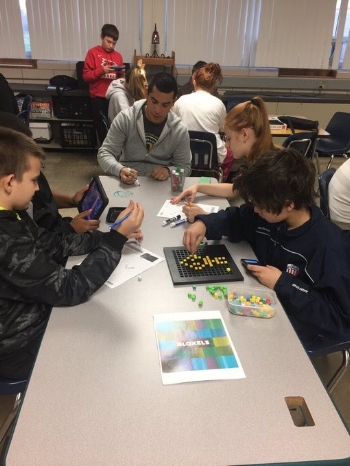We sat down with Bloxels Ambassador Manuel Herrera to learn how his district is using Bloxels to emphasize the power of storytelling in the classroom.
For this Ambassador Spotlight, we’re getting to know Bloxels Ambassador Manuel Herrera. Herrera is the Innovation Coordinator for the Affton School District, which is located just outside of St. Louis and encompasses 2,500 K-12 students. As Herrera puts it, “‘Innovation Coordinator’ is a fancy title that means I work with teachers and technology, making those two worlds collide in the best and most efficient way possible.”
In addition to this role, Herrera is an adjunct professor at Webster University, where he teaches courses on video for educators and learning space design. He also works at a St. Louis-based nonprofit that puts on free or very low-cost educational events for teachers.
Herrera took time out his busy schedule to share his enthusiasm for Bloxels and why it’s been such a crucial tool for his school district. Here’s what he had to say.
Hi, Manuel! Thanks for sitting down and talking with us. First, we want to know how you implement Bloxels in a new classroom. Do you train teachers to use Bloxels, or do you take a hands-on approach with the students?
I’m usually very hands-on, teaching teachers at the same time that I’m teaching kids. This wasn’t always my approach; early on, I would stand in the back of the classroom, simply observing and acting as support for the teacher. Since then, we’ve fine-tuned that process quite a bit and started to introduce kids to Bloxels a little more slowly. We have a lot of steps that we have the kids do before they actually make a video game.
I also have a solid group of teachers who have been introducing students to Bloxels with me for the past three years — so now they’re my ambassadors in a way, which has been great.
If you’re not emphasizing the video game component right away, what are you emphasizing instead? How has that worked in your district?
I love Bloxels because it gives me the opportunity to work with kids and go back to the basics of learning, planning, brainstorming, and storytelling. We try not to really hype up the video game piece of it right away. What we’re doing is teaching kids to tell stories, because even at the high school level, kids often haven’t developed strong storytelling skills.
When we introduce Bloxels, we emphasize coming up with characters, those characters’ characteristics, and their storylines. We have the kids answer a few questions to flesh their characters out: do they have superpowers? Arch enemies? Weaknesses? Once those details have been ironed out, we have the kids start storyboarding. This exercise teaches them how to brainstorm and communicate their ideas in an effective and interesting way, beginning to end.
When we first started off with Bloxels, we were handing students the device and telling them to go off and make a video game, but we soon realized that we can help guide them in a more strategic way. That’s when we began emphasizing the storytelling piece. So now I teach kids how to sketch out a simple story and make the ideas in their heads more tangible before they actually start building.
That storytelling component seems really important to how your district is using Bloxels. Do you usually start with the storybuilding element in humanities classes? How do you apply it in STEM classes?
There are definitely some subjects that lend themselves to Bloxels activities really well, especially ELA and social studies classes. Those classes tend to be based on stories, so it’s really easy to translate the lessons into Bloxels stories. Say a class is learning about the branches of government or the American Revolution — that’s a story! That’s history!
Science gets a little trickier because the concepts aren’t as obviously tied to stories, but we have gotten creative in overlaying a storytelling framework on those subjects as well. For example, we’ve done photosynthesis and had the main character be a droplet of water or a cell.
Why do you think Bloxels is different from other game-based learning products out there?
Bloxels is unique because kids walk away with something that’s interactive and that they can share with people. A lot of kids love video games, and they can create a legitimate video game with Bloxels! That’s what makes it unique. For the most part, the things kids create digitally in classrooms are presentations or graphics. Those are just pictures on the wall.
What if they could take that, say, dinosaur that they drew, make a video game out of it, tell a story with it, and share it with friends? Then you’ve made it into a conversation, you’ve made it social — you may even have opened up the door for a potential career! Maybe one kid will spend all day designing that dinosaur and another kid will spend the day creating a story for it. Now those two kids have created a bond with each other, and they’ve discovered the parts of the creative process that they enjoy most. It’s a good entry point into a lot of careers for kids, including coding.
We heard you’re going to be speaking at a lot of events coming up! Where can we catch you?
Holy cow, yes! I have a lot of events coming up, and I’m excited about all of them. I’m going to speak at an EdTech conference in Indiana soon, then one in Iowa, and then Boston. And in November I’m speaking at an International Society of Technology in Education (ISTE) event in Seattle. That one is different because it’s more workshop-based.
I’ve also been invited to speak at an event in Portland in February that’s exclusively administrators, so I need to tweak my presentation! And in January, I’m going to an event in Florida, where I’ll be speaking on a panel with Robin from Pixel Press.
Here’s where I’ll be in the next few months — come stop by!
Oct.11-12: ICE, Noblesville, Indiana (featured speaker)
Oct.14-16: ITEC, Des Moines, Iowa (featured speaker)
Oct.18-19: MassCue, Boston, Massachusetts
Nov.10-11: ISTE Creative Constructor Lab, Seattle, Washington (featured speaker)
Jan.27-30, 2019: FETC, Orlando, Florida





